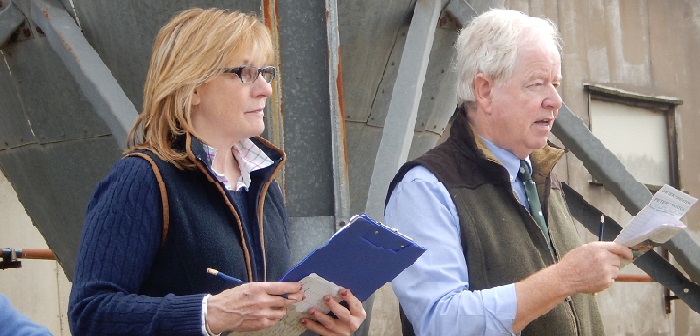It remains difficult to come up with any positive points as far as the UK pig industry is concerned with prices still in retreat and spare pig capacity under yet more pressure as abattoirs have continued to roll numbers due to labour shortages.
Although the SPP has only slipped by 0.97p this week to stand at 159.25p, very low priced imported pig meat continues to undercut the UK market by a wide margin with no immediate signs of a reversal in this trend.
Spot prices are few and far between although where there is any space regular sellers might be able to achieve prices in the 140p/kg region, but one off loads of non-farm assured pigs could be as low as 130p/kg space permitting, which at the moment is not available.
With a rising number of overweight pigs in the system, one helpful move by C&K Meats was the announcement today that the upper weight limit for gilt pigs has been increased from 105kg to 110kg.
UK weekly contribution prices are also continuing on their downward path between 150p and 138p.
One of the few prices that has not gone in the wrong direction is the value of the Euro which has hardly moved over the past seven days and traded on Friday worth 85.76p.
Unfortunately, despite the Euro holding its recent value, UK cull sow export prices have tumbled by up to 8p/kg with values as low as 38p-44p/kg according to load size and after slaughter and transport deductions producers are receiving little more than £50 per head for their culls at a time when some replacement gilts are still costing in the region of £200 per head.
Contract weaner prices remain firm with a slight downward slant and 7kg RSPCA assured piglets have generally traded in the £37-£40/head region, but for those not on contract prices are in freefall and no quotes are available until the market settles down.
The very high cost of pig feed ingredients continues to cast a shadow over the industry with UK futures prices for feed wheat for September delivery quoted at £194/t, but September 2022 is looking slightly less expensive at £178/t.
Spot ex farm UK wheat deals have averaged £181.10/t.
Feed barley sales have been agreed at £182/t for September and £168/t for September 2022.
Protein prices are still creeping up with Hipro soya for September-October traded at £375/t and May-October 2022 at £338/t.
Rapemeal has firmed to £252/t for September-October.
And finally, with large numbers of unsold pigs building up on farms producers are caught between a rock and a hard place as feed usage and average slaughter weights continue to rise at a time when prices are falling putting liquidity and overdrafts under pressure in some cases, unless a reverse of this trend occurs soon.
One of the main causes of the pig supply bottleneck is the lack of suitably skilled staff at abattoirs and processing factories as well as a shortage of HGV drivers and the ever present risk of Covid rearing its ugly head as autumn approaches and hitting staffing levels.
Meat traders are asking the Home Office to allow migrant meat processing labour to be treated as skilled workers and to be eligible for Skilled Worker Visas to lift the volume of meat passing through abattoirs, although currently some meat processor labour does not meet the appropriate threshold levels to be sponsored for a Skilled Worker Visa.
Unless a swift solution can be found to the imbalance of the whole pig meat supply chain, according to industry contacts welfare cases will start rising when producers run out of accommodation and funds, but currently any significant pig price revival still looks far away.
The collateral effects of the current situation are starting to be felt in many sectors of the UK pig industry with a shortage of qualified vets, lorry drivers, rendering space and available cold store space, to name a few.




